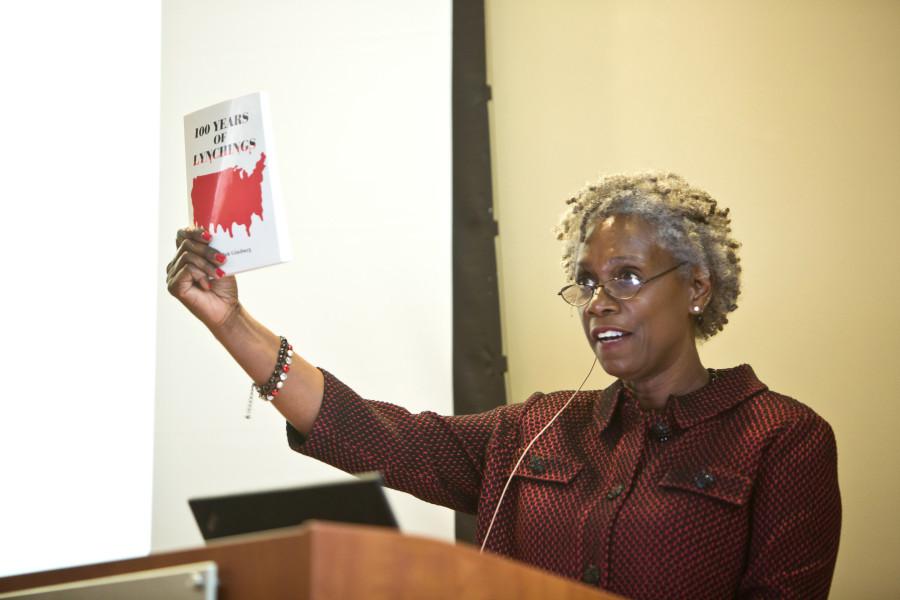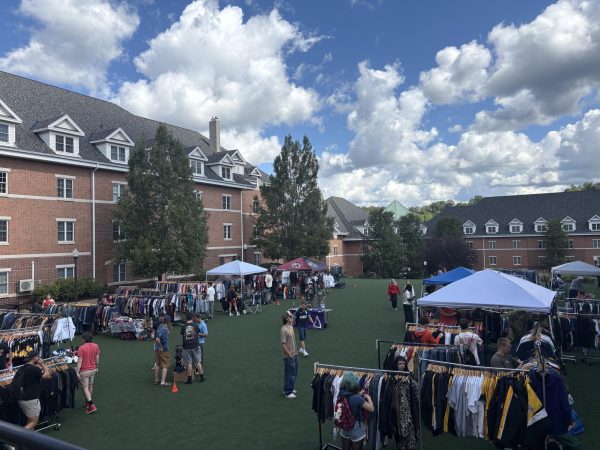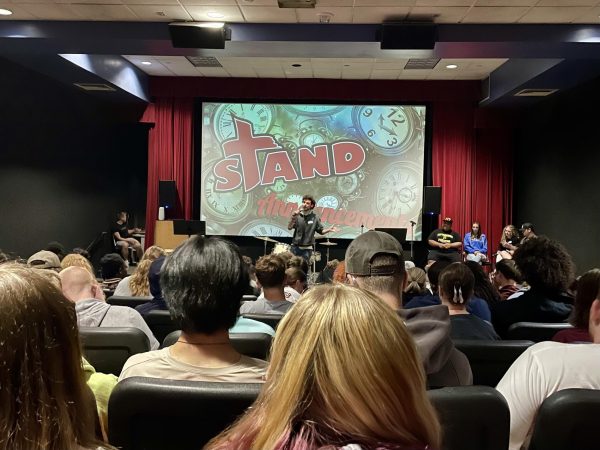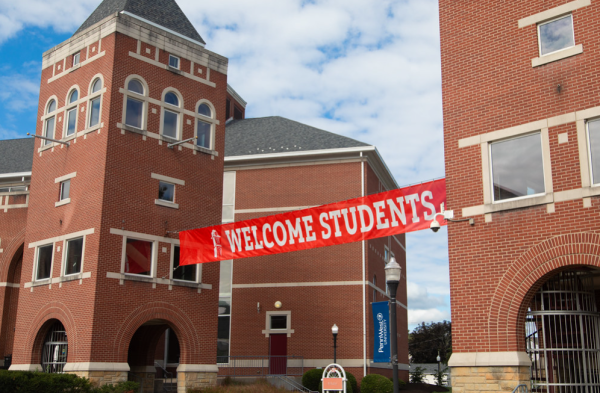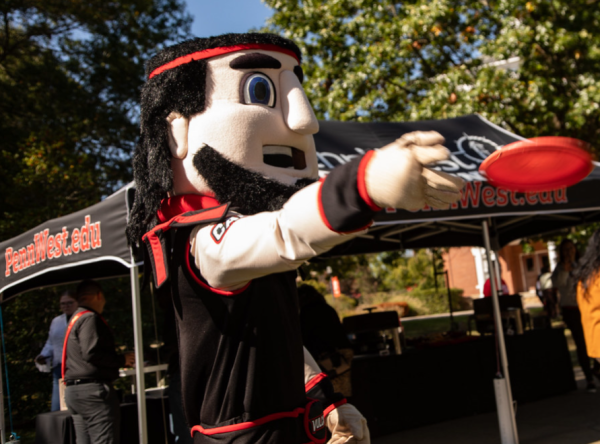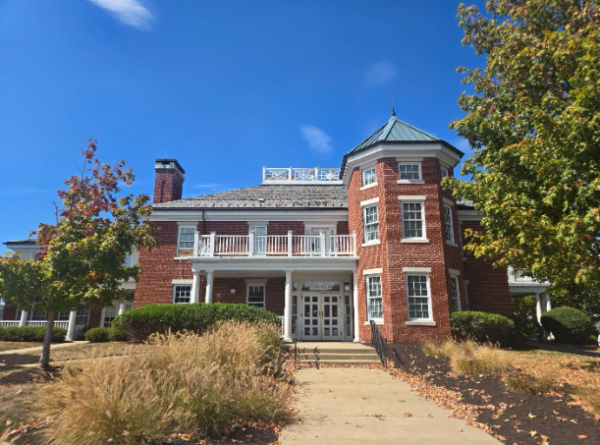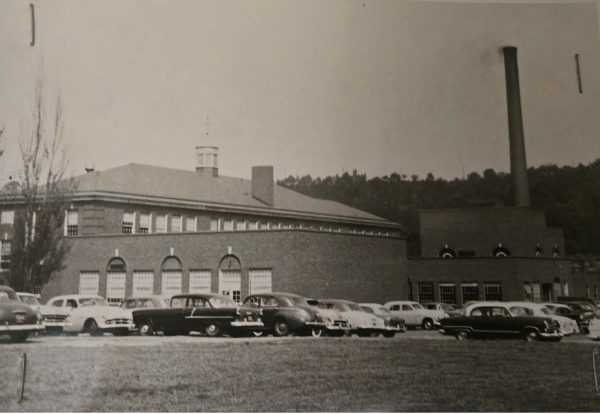Caryl Sheffield gives her last lecture
Cal U professor reminisces about her life’s journey
On March 31, what started as a room with only a few people transformed into a full house as students lined up outside of the conference room of the Convocation Center’s north wing to get a good seat. Associate Provost Caryl Sheffield, who will be retiring this year, stood at the front, and began a new tradition at California University of Pennsylvania; the Last Lecture.
Entitled “Reflections: One Woman’s Journey for Social Equity,” Sheffield’s lecture was an exploration of her life as she experienced various American movements, including the civil rights movement, second-wave feminism, and the protests against the Vietnam War.
“As I began to compose the lecture, I knew that I wanted to talk about how my life was influenced by being an African American female growing up in the 50s and 60s,” Sheffield said. “The overarching theme that guides this historical memoir, as I call it, is the ongoing efforts to achieve racial, gender, and social equity.”
As the sixteenth of twenty-one children, Sheffield grew up in a poor family, although her father was the owner of a house painting business, worked for an electric company, and served as minister at an African Methodist Episcopal (AME) church. During her childhood, Sheffield had her first experiences of racism, though unaware of what it was at the time.
“The piano teacher wanted me to play the beginners rendition of some boring semi-classical piece from the songbook, but I wanted to play Shortnin’ Bread,” Sheffield said. “Well, my mother was not having it. She said it was the kind of song that a “colored” girl would be expected to play. Now I get it. It is racist, stereotypical and degrading. I was totally oblivious.”
Despite the racism and poverty that surrounded Sheffield, her family pulled through with “lots of love and faith in God.” Many accomplishments accompanied that love and faith
Her father and a few black leaders in the community successfully desegregated the local YMCA, her brother became its first black member, and she became the first black varsity cheerleader in the history of the New Brighton school district.
The family’s financial shortcomings also resulted in Sheffield’s parents placing an emphasis on higher education. Suffice it to say, Sheffield said, her parent’s goal to see their children succeed academically was realized.
“Of my 20 siblings, all of us graduated from high school, 13 of us have earned at least a bachelor’s degree, 7 of us have earned a master’s degree, and 2 of us have earned a doctorate,” Sheffield said.
Sheffield herself enrolled at Cal U, then known as California State College, in the fall of 1969. It was at Cal U that her ideals of activism and advocacy began to take form.
“I was active in the Black Student organization. Like our counterparts across the country, we marched in front of the library and President Roadman’s office in protest of unfair treatment of black students, for more minority faculty members, and against the draft and the Vietnam War,” Sheffield said. “These activities awakened a militancy in me that is still there; I even sported a huge Afro.”
Alongside her activism, Sheffield also met her closest friends and pledged Alpha Kappa Alpha Sorority Inc. It seemed like things were getting better and better. During her freshman year, however, she became pregnant.
While these circumstances may have deterred most from finishing school, they didn’t stop Sheffield. She was able to finish her education and graduate on time. According to Sheffield, she has her mother to thank for that.
“She would raise my daughter [those two and a half years] so that I could finish school,” Sheffield said. “I count that as the most significant event in my life. Not the pregnancy so much, but the opportunity to go back to college to complete the degree after my daughter was born. I am eternally grateful to my mother for the sacrifice she made for my future.”
Following graduation and the years that followed, Sheffield juggled between caring for her daughter at home and financially supporting her with a job teaching Special Education within the Pittsburgh Public School district.
She also found time to go back to school, receiving her Master of Education (M.Ed.) in Educational Guidance and Psychology from Slippery Rock University, and a doctorate of education in instructional design and technology from the University of Pittsburgh.
Noting that receiving her doctorate “changed her life as it opened doors to career opportunities that she never expected,” Sheffield was offered various positions at multiple institutions like Penn State and the University of Wisconsin. However, when it came time to choose where she wanted to teach computer technology to education majors, Sheffield decided she wanted to return home.
“Much to my advisor’s chagrin, I happily accepted the position at Cal U, although she would have preferred that I join the faculty of a Research I (one) University,” Sheffield said. “But that wasn’t what I wanted. I wanted to teach at Cal U. I wanted to give back what had been given to me. Being offered the faculty position was a blessing and an honor.”
Joining the Cal U community once again in 1991, Sheffield began to reminisce on her teaching experiences with her students.
“In 1991 computers were just beginning to be used in K-12 schools, and I enjoyed teaching my often computer-phobic students about the potential of computer technology to enhance student learning,” Sheffield said. Forever an activist, Sheffield also taught a course aimed at teaching students the value of equality. “I also taught Teaching in a Multicultural Society, a required course for all teacher education students,” Sheffield said. “They learned to keep an open mind as we discussed the challenging concepts of diversity, prejudice, and equity related to teaching children.”

In 2000, Sheffield was awarded the Fulbright Scholarship, which allowed her to study abroad and conduct research that can be applicable to the classroom. She spent half a year at the University of the West Indies in Kingston, Jamaica and was given the task of helping teacher’s colleges apply technology to their curriculum.
Sheffield said the experience showed her the advantages she had as a teacher at Cal U.
“The student teacher, in preparation for the lesson, reached down and picked up a large cardboard box of colored plastic bottle tops,” Sheffield said. “You know, the kind that comes on the small plastic iced tea or milk bottles. He used these bottle-caps as a manipulative. The teachers in Jamaica knew how, out of necessity, to make do with what they had available to them.” Sheffield said.
Most recently, Dr. Sheffield is credited with chairing the Frederick Douglass Institute (FDI) Visiting Scholar program, which has found success in diversifying the faculty within the Cal U community.
She names some of the scholars, including Kelton Edmonds and Alphonso Vergeray of the History and Political Science departments, Randy Tilmutt of the Music department, Michelle Torregano of the Childhood Education department, and current scholar Reuben Brock of the Psychology department, as some of the diversified faculty currently at Cal U.
Just last year, the FDI has shown its appreciation to its chair by establishing the Caryl J. Sheffield Faculty Excellence Award. Dr. Sheffield gladly accepts the kind words and tokens of appreciation that Cal U has given her, but what she appreciates the most is the togetherness of the Cal U community, described by the South African word “Ubuntu.”
“We are all bound together in ways that can be invisible to the eye; that there is a oneness to humanity; that we achieve ourselves by sharing ourselves with others, and caring for those around us,” Sheffield said. “Some of you are standing on my shoulders, too; that’s the way it should be.”
Sheffield’s long career at Cal U may be coming to a close, but that doesn’t mean her work is done. After retiring and moving to Florida, she plans to continue providing mentorship to young girls of color.
Before leaving Cal U, Sheffield, as a teacher and mentor, wanted to leave some words of encouragement for students.
“One thing I will say to all students, is to keep your eyes on the prize,” Sheffield said. “Stay focused on the goals you established prior to arriving at college. It’s okay to have fun as well, but remember how important it is to get that degree. Make the most out of your college experience and there will be nothing but success ahead of you.”

